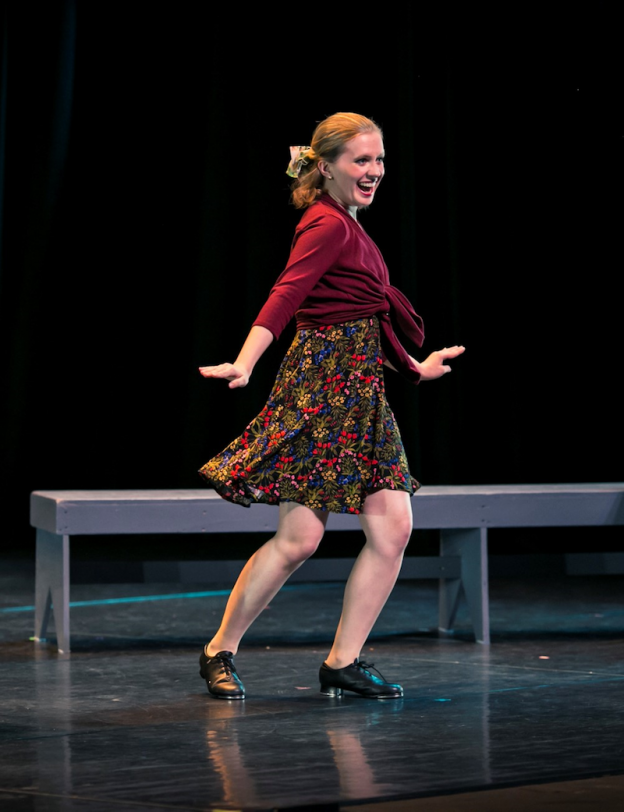There is no question that senior Molly Murphy finds happiness through dance. Any of her performances at the Swarthmore student dance concerts these past four years has showcased not only her finesse and technicality in tap dancing, but also her ability to brighten the stage with an infectious smile and an energy that radiates throughout the theater. Off the stage, Molly is a little more reserved and soft spoken, though her gentle and soothing demeanor is still as infectious as her stage presence. During my conversation with her, I found myself drawn in, listening to her words with an attentiveness that follows when someone has hushed and important things to share.
“I’m a very quiet person; tap is when I let out a lot of noise. It’s my happy place. People tell me I’m very different when I tap dance or when I’m performing tap than in every other circumstance. Tap is another way for me to express myself and communicate in ways that I often can’t do when I’m talking to people.” Tap has been a mode of expression for Molly and has provided a source of support while at Swarthmore. Despite her shyness in outside contexts, Molly has discovered a form of communication that has allowed her to connect with students and professors in and out of the studio, allowing her to lay hold of dance as an identity within her community.
“Coming to Swarthmore and meeting Sharon Friedler, talking with her and taking classes with her, I realized how big a part dance was in my life. Before Swarthmore, I never really thought of it in relationship with my identity. I took Arts as Social Change and Dancing Identities and did my first independent project [all with Professor Friedler]. I realized it was something I couldn’t put to the side. Dance is something that’s gotten me through Swarthmore and being a dance minor ensured that dance wouldn’t get pushed aside in the face of other commitments.”
These academic dance courses, particularly Arts as Social Change and Dancing Identities, opened Molly’s eyes to the possibility of dance to influence people’s lives and create change in communities. As a Peace and Conflict Studies major, Molly has naturally been interested in the ways that dance can offer meaning and impact.
“I’m a Peace and Conflict Studies major; taking Arts as Social Change made me more aware of dance as a positive form of social change, whether that is in youth programs, prison settings, or Sharon’s dance programs for people with Parkinson’s Disease. It’s kind of a therapeutic tool for a variety of different communities and a way to pass on tradition and stories.”
Molly hopes to continue participating in dance communities even after she graduates from Swarthmore this spring. Recently, she has been taking swing dance and tango classes in Philadelphia, and finds that having common ground, a passion for dance, makes connecting with people a little bit easier. Even despite the exciting possibility of meeting new people in dancecommunities, Molly is still nostalgic about her time at Swarthmore and nods agreeably when I ask her if there are things she will miss about the Musicand Dance Department here.
“Oh yeah. All of the LPAC crew and teachers and professors in the dancedepartment, they really made Swarthmore home for me. I’m going to miss that because coming into Swarthmore, it was a much more supportive danceenvironment than what I’d experienced in high school, which was much more competitive. It’s been nice to TA for the tap repertory class here and be able to do a few of my own pieces and work one on one with professors on how to develop ideas. [It made me see that] dance is an art form in its own right and [taught me] how to use and change space and locate yourself within that space. So I have Swarthmore to thank for helping me to understand what my relationship is with dance and how it has shaped my identity.”
Molly will be performing for the last time in the Swarthmore student danceconcert this spring with the tap repertory class, as well as a smaller piece she choreographed herself. She is approaching this piece in a similar way to the tap piece she choreographed last spring, which involved three of her friends who were graduating. Considered her fondest dance memory at Swarthmore, the piece was titled “Until Tomorrow” and was about friendship and the idea that people may not always be in the same space, but that experiences do last even if you’re not always together.
This time, that message will be for Molly and the other seniors in the tap piece, a reminder of the friendships formed over the past four years and the endless possibilities in the coming years.
Marion Kudla ’19
